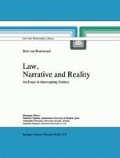Abstract
Not too long ago, we could do without narratology and be quite happy in analysing stories. Notions like ‘point of view’, ‘perspective’ or ‘voice’ were rather old-fashioned but reliable tools in understanding how a text relates its tale to us, its readers. We were perfectly able to ask and answer questions like the following: From which point of view, framed (by the text) as being inside or outside the text, is a story told? Within which perspective are references established? By which voice meanings ordered and distributed? Does the story touch upon other points of view, inside or outside the text? Does it touch upon not only other characters’, but also the author’s and the reader’s points of view?1) Take, for instance, the first sentence of Through the Looking Glass:
One thing was certain, that the white kitten had had nothing to do with it — it was the black kitten’s fault entirely.
Access this chapter
Tax calculation will be finalised at checkout
Purchases are for personal use only
Preview
Unable to display preview. Download preview PDF.
Reference
Cf. Chamberlain (1990: 3): `Narrative perspective has been described as the essence of the narrative art (…). It plays an essential role in the writing and reading of texts and has become a major issue in the theory that narrative gives rise to. Different theoretical approaches have sought to define it with terms such as `person’, `point of view’, `reflector’, `voice’, `central consciousness’ and `focalization’.’ Chamberlain questions the notion of perspective. I will return to this in chapters 5 and 6.
Greimas’s `actantial’ model. For an exposition with regard to law, Jackson (1985) can be seen as the mould of what `having a point’ amounts to for classes of narratives.
See Forster (1974: 60). Forster makes a distinction between `story’ en `plot’, limiting `story’ to `a narrative of events arranged in their time-sequence’, while `plot’ stands for `also a narrative of events, the emphasis falling on causality’. In my view, this is a questionable way of making the distinction, for instance because the temporal order is bound to lead to distinguishing between more and less significant moments in time, presupposing a minimal plot; unless, of course, there is truly an enumeration with neutral conjunction, but then there is no story in the first place. That is why I slightly alter Forster’s thesis by means of the word `full-fledged’, doing justice to another place in the book: `A story, by the way, is not the same as a plot. It may form the basis of one, but the plot is an organism of a higher type (…).’ (ibid.: 20)
From here I follow a line of argument in Culler (1981: 169 ff), the chapter on `Story and discourse in the analysis of narrative’.
Bal (1980: 14) makes the same distinction by means of the terms `geschiedenis’ (history) en `verhaal’ (story). It is `(…) based on the difference between the sequence of events and the way in which these events are represented’ (my translation). See also Ricoeur (1983–1985), III: 275): `Raconter quoi que ce soit (…), c’est le raconter comme s’il s’était passé.’
Culler (1981: 1972 ff). But note also (in Dutch) Verhoeven (1966).
Culler (1981: 174); my emphasis.
Culler (1981: 175).
For the first reading, see Freud (1918: 156 ff); for the second, Freud (1918: 166 f0.
As in The Republic and Phaedo.
In chapter 5 I shall present some epistemological amendments, as I cherish the old-fashioned belief that a theory of literature is not per se a theory of knowledge.
Cf. a later publication: White (1986: 21).
I derive this definition of discours from Jan M. Broekman (1973). I have pondered on translating the term itself by `linguistic tissue’ because, like in a tissue, the representing front is very opaquely, but still systematically matched onto (and, reversely, produced by) the knots and threads at the back.
Under the revealing title Oublier Foucault (1977), Baudrillard explained this pitfall in Foucault’s approach. According to Baudrillard, Foucault forgets that he is still committed to the claim of privileged access to a higher - order reality linked up with his theory. After having written the first part of the history of sexuality, Foucault changed to a different paradigm of analysis, which escapes the criticism.
Cf. Also the explicit title of his later work, On Deconstruction.
Readings ( 1991: 136) believes that there is reason to criticise Culler’s approach from views taken from Lyotard. Although Readings mainly focuses on Paul De Man’s work, Culler is involved to the extent that the latter has supported De Man’s project in public. If Reading’s objections are aimed at De Man, they also aim at Culler. Their core lies with this approach denying the historicity of the text, as it always and only goes for carving out some essential meaning leaving the rest behind as rubbish.
Also those in De Man’s project, in my view.
Derrida (1985).
Author information
Authors and Affiliations
Rights and permissions
Copyright information
© 1997 Springer Science+Business Media Dordrecht
About this chapter
Cite this chapter
Van Roermund, B. (1997). A Hypothesis about Narratives. In: Law, Narrative and Reality. Law and Philosophy Library, vol 30. Springer, Dordrecht. https://doi.org/10.1007/978-94-017-2051-9_2
Download citation
DOI: https://doi.org/10.1007/978-94-017-2051-9_2
Publisher Name: Springer, Dordrecht
Print ISBN: 978-90-481-4871-4
Online ISBN: 978-94-017-2051-9
eBook Packages: Springer Book Archive

